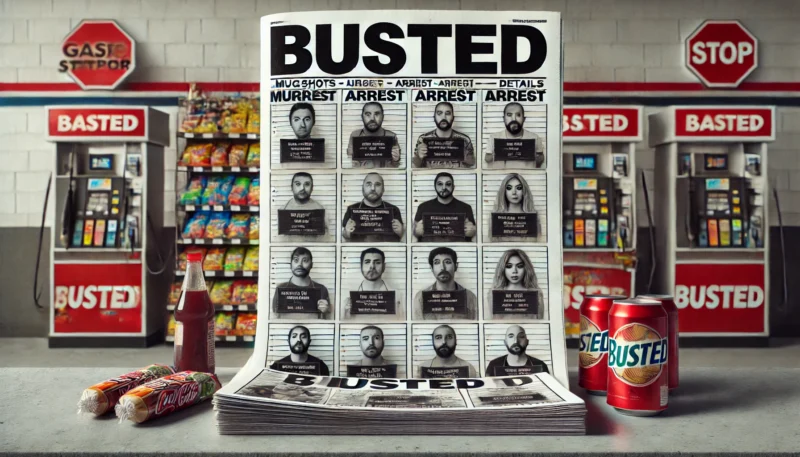The busted news paper is a unique publication that has sparked both interest and controversy. Known for publishing mugshots and details of recent arrests, it has been a source of fascination and debate in many communities. These newspapers often claim to serve the public by increasing awareness and accountability, but they also raise ethical and legal questions about privacy and public shaming.
In this article, we’ll explore the purpose of busted newspapers, how they operate, their impact on individuals and society, and the growing debate surrounding their existence.
What Is a Busted News Paper?
A busted news paper is a tabloid-style publication that compiles and publishes mugshots of individuals who have recently been arrested. Typically distributed locally, these newspapers may include:
- Mugshots: Photographs of individuals taken at the time of arrest.
- Arrest Details: Information such as charges, arrest dates, and locations.
- Public Notices: Updates on legal proceedings or law enforcement activities.
- Advertisements: Often for bail bonds or legal services.
These publications are usually sold in convenience stores or gas stations and cater to readers interested in local crime and law enforcement updates.
The Purpose of a Busted News Paper
Busted newspapers are marketed as tools for public awareness and community safety. Advocates argue that these publications:
- Promote Accountability:
- By publicizing arrests, they claim to deter criminal behavior.
- Keep Communities Informed:
- Residents stay updated on local crime trends and law enforcement efforts.
- Provide Transparency:
- Publishing arrest records ensures the public has access to legal proceedings.
- Support Legal Services:
- Advertisements for attorneys and bail bondsmen provide resources for those facing charges.
How Are Busted News Papers Compiled?
These newspapers rely on public records and information made available by law enforcement agencies. The process typically includes:
- Accessing Arrest Records:
- Law enforcement agencies release mugshots and arrest data as part of public records.
- Organizing Content:
- The information is compiled into a formatted layout, often grouped by county or date.
- Printing and Distribution:
- Copies are printed and sold in local stores, with some offering digital editions.
Controversies Surrounding Busted News Papers
Despite their stated purpose, busted newspapers have faced significant criticism due to concerns about:
1. Privacy Violations
- Publishing mugshots may harm individuals who have not been convicted of a crime.
- The stigma of being featured can lead to social and professional repercussions.
2. Public Shaming
- Critics argue that these publications encourage ridicule and humiliation.
- Many individuals featured may struggle to reintegrate into society after their release.
3. Profit-Driven Motives
- Some accuse busted newspapers of exploiting public records for financial gain.
- Advertisements for bail bonds and legal services create a perception of profiting from misfortune.
4. Potential for Errors
- Incorrect information or misidentification can lead to serious consequences for individuals.
The Rise of Digital Alternatives
The concept of a busted news paper has evolved with the rise of online platforms. Many websites now offer digital versions of mugshot publications, often searchable by name or location.
Advantages of Digital Platforms:
- Easier access to information for a broader audience.
- Real-time updates on arrests and legal proceedings.
Drawbacks of Online Mugshot Databases:
- Information remains online indefinitely, even after charges are dropped.
- Individuals face additional challenges in removing their records from these platforms.
Ethical and Legal Challenges
The publication of mugshots and arrest records is a legally gray area. While public records are generally accessible, their publication raises ethical concerns.
Key Issues:
- Right to Privacy vs. Public Interest:
- Balancing transparency with respect for individual rights remains a challenge.
- Defamation Claims:
- Misreported or inaccurate information can result in legal disputes.
- Legislative Changes:
- Some states have passed laws limiting the use of mugshots to prevent misuse.
How Communities Respond to Busted News Papers
Local communities often have mixed reactions to busted newspapers. While some residents appreciate the transparency, others criticize their negative impact.
Positive Community Responses:
- Increased awareness of local law enforcement activities.
- Platforms for open discussions about crime and safety.
Negative Community Responses:
- Concerns about reinforcing stereotypes and stigmas.
- Calls for reform or regulation of mugshot publications.
Tips for Handling a Mugshot Publication
If you or someone you know is featured in a busted news paper, consider the following steps:
- Verify the Information:
- Check the details for accuracy. Incorrect information can be challenged.
- Consult Legal Counsel:
- Seek advice from an attorney about potential remedies.
- Request Removal:
- Some publications may allow mugshot removal for a fee.
- Focus on Moving Forward:
- Engage in community service, education, or other positive actions to rebuild your reputation.
Alternatives to Busted News Papers
Communities seeking to stay informed without compromising individual dignity can explore alternatives such as:
- Official Law Enforcement Updates:
- Police departments often release arrest logs without sensationalizing them.
- Community Watch Groups:
- Local organizations provide crime updates while promoting positive engagement.
- Public Records Websites:
- Search arrest records through official government platforms.
The Future of Busted News Papers
The debate surrounding busted newspapers highlights the need for balance between transparency and ethical responsibility. Future developments may include:
- Stricter Regulations:
- Laws limiting the publication or accessibility of mugshots.
- Revised Formats:
- Publications that focus on crime trends rather than individual arrests.
- Greater Public Awareness:
- Educating communities about the consequences of public shaming.
Conclusion
The busted news paper remains a polarizing concept, blending transparency with controversy. While it provides communities with access to arrest records and law enforcement updates, it also raises significant ethical and legal questions. As society evolves, it is crucial to find better ways to balance public interest with the dignity of individuals, ensuring accountability without unnecessary harm.
Also Read: How To Get Free Tiktok Followers in 2025
Frequently Asked Questions
What is the purpose of a busted news paper?
A busted newspaper aims to provide transparency by publishing arrest records and mugshots, though it is often criticized for public shaming.
Are busted news papers legal?
Yes, they are generally legal as they use publicly accessible records, but ethical and privacy concerns persist.
How can I remove my mugshot from a busted news paper?
You may contact the publication directly or consult a lawyer for assistance in getting the image removed.
Why are busted news papers controversial?
They raise concerns about privacy violations, public shaming, and profiting from individuals’ misfortunes.
Do busted newspapers contribute to community safety?
While some argue they raise awareness, others believe they promote stigma rather than solving systemic issues.
Are online mugshot databases different from busted newspapers?
Digital databases offer similar information but often face greater scrutiny due to their permanence and wider reach.
What alternatives exist to busted newspapers?
Community-focused crime updates from law enforcement or local organizations can provide valuable information without shaming individuals.




